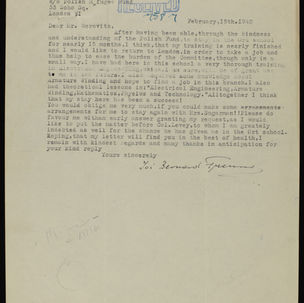
Complicating narratives of the Kindertransport
Digital Exhibition
Born 12.2.23 in Vienna.
This selection of documents focuses on agency, identity and transmigration.

Isi Freund, age 14
MS 183 563 Folder 1 (Special Collections, Hartley Library, University of Southampton)
Isi Bernard Freund was born 16.10.24 in Hannover, Germany. He was an only child. Isi and his parents were deported to Zbąszyń, Poland in the Polentaktion and Isi was brought to Britain by the Polish Jewish Refugee Fund arriving 30 August 1939. Isi was sent to the same training farm training as Heinz Danziger and when it was closed down in early 1940, he was sent to the Leeds OSE/ORT, a German-Jewish trade school for boys that had been evacuated from Berlin and relocated in Leeds in 1939. After he finished his training in Leeds, Isi came to London in mid-1942 and came under the care of the Jewish Board of Guardians who found him lodgings and a job as an electrician. Like many other young refugees, Isi joined the British Army in late 1944. After his war service, Isi returned to Britain, married and became a naturalised citizen. At some point later in life, Isi emigrated to Mexico, where he remained for the rest of his life. His parents were murdered in the Holocaust.
Isi’s letters to the Polish Jewish Refugee Fund are notable for their jocularity, informality and humour, which was unusual in the correspondence between refugee children and the refugee agencies that supervised them. In particular, his letters to Sidney Gerrard (Documents 2, 3, 4), who briefly headed the Fund’s Children’s Department, are revealing of Isi’s character, his agency in getting requests for pocket money fulfilled, and of his obvious pleasure in corresponding with someone with whom he could form a bond of friendship. This is particular evident in Document 4, in which Isi jokes with Sidney about himself (“I…am climbing the road to ‘fame’ and honour”) and Sidney’s call-up to the army (“I sincerely hope that the government will reconsider this important matter & spare the H.G. the loss of its most courageous warrior!!”). Without parents to share with whom to share his experiences, Isi, like many Kinder, turned to carers whom they perceived as sympathetic, understanding and supportive. His letters to Moise Gorowitz (Documents 5, 6,7), which all contain requests of some kind, are somewhat more formal and even obsequious in tone (Document 7). Nevertheless, he did not hesitate to ask if the Polish boys could be treated the same as the German and Austrian refugees (Document 7), and to persist in his quest for properly fitting clothing (Documents 6 and 7).
Isi’s national identity and his desire to re-emigrate are also reflected in the documents. He enlisted Sidney Gerrard’s help to get the necessary documents to prove his Polish nationality to the Tribunal Board (Documents 2 and 3) and implied to Sidney that even though born in Germany, his Polish identity set him apart from the German and Austrian boys at the ORT (Document 2). His Certificate of Identity, clearly showing Polish nationality is included in the collection (Document 1).
Isi tried very hard to get permission to re-emigrate to Mexico to join relatives there, and the reply he received from Bloomsbury House (Document 5) laid out the many reasons why this would be impossible in 1941, demonstrating the difficulties Kinder encountered when trying to re-emigrate in wartime.
Also included in this collection is a Refugee Children’s Movement home visit report from 1943 (Document 9). Kinder were supposed to be visited at least twice a year, and such reports filed by representatives of the Refugee Children’s Movement. There is ample evidence that not every child received these visits as scheduled, especially in the early war years, but it does appear as if the visits became more regular in the later war years and these reports provide a useful reference point for the kinds of welfare checks the organisation had put in place.
The below documents are from the Schonfeld Collection (MS 183) at the Special Collection, Hartley Library, University of Southampton. All of the below documents are used with permission of the University of Southampton Special Collections and the West London Synagogue.
Please navigate the thumbnails below to view the full-size documents. Each document is accompanied by a description and archive reference.












